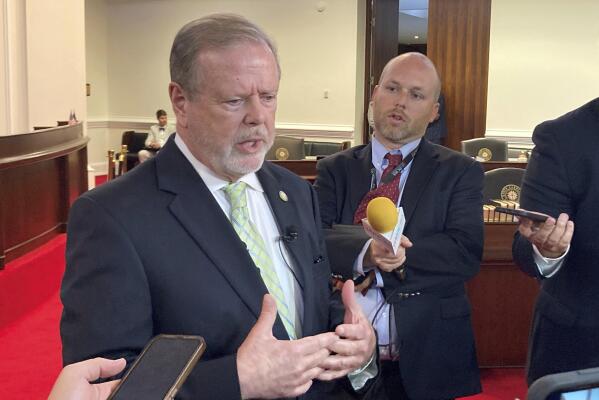North Carolina sports, horse-race betting legislation backed by Senate in key vote
RALEIGH, N.C. (AP) — Legalized sports gambling in North Carolina cleared what could be one of its last remaining legislative hurdles on Wednesday as a measure to authorize and regulate betting and tax revenues received a strong affirmative vote in the state Senate.
Senators voted 38-11 for the chamber’s version of the measure, which also would authorize adults over 21 to bet on live horse racing in the state or elsewhere.
The bill needs one more Senate “yes” vote on Thursday before it gets sent to the House, which passed a version in March that omitted horse racing and directed the state to levy a lower tax on gambling operators who receive licenses to offer the games.
The House will have to decide whether to vote to accept the Senate’s changes. Doing so would send the Senate proposal to the desk of Democratic Gov. Roy Cooper, who has expressed support for legalized sports wagering.
Rep. Jason Saine, a Lincoln County Republican and chief sponsor of the House bill, said in a text that he would recommend to the full chamber that it accept the Senate version. But Speaker Tim Moore of Cleveland County told reporters it was probable the House would seek to negotiate a compromise with Senate leaders that he said could possibly include expanding other forms of gambling.
The margin in support of sports wagering is more precarious in the House than in the Senate, where substantial Democratic and Republican majorities voted Wednesday for the legislation.
The competing versions would direct the state Lottery Commission to issue a limited number of licenses to entities that could sign up bettors, who would create online accounts to wager from mobile phones or computers on professional, college and Olympic-type athletics.
About half of the states in the U.S. currently allow mobile or online sports betting. As the ninth-largest state, North Carolina is considered a profit source for wagering operators and pro sports franchises that could also stand to benefit.
Legal sports gambling in North Carolina is only available right now at three casinos operated by two American Indian tribes. Bill sponsors said other sports gambling is already happening underground and that regulating and taxing it is the best way to control it.
“We allow free people to make decisions for themselves as to what they want to do with their resources. I think that is a huge benefit in our society,” Senate leader Phil Berger of Rockingham County, told reporters after the vote. “For most people, it’s seen as a form of entertainment, and it’s entertainment that people will engage in using their own resources.”
Both versions of the bill would permit sports wagering licensees to set up locations at or near stadiums and arenas, where account holders could watch games and make bets. But the Senate version also would allow anyone to make cash bets at a venue’s betting window, even without creating an account. Should the Senate’s version prevail, horse racing would be offered through licensees separate from sports wagering operators and different online accounts.
The Senate would tax sports wagering at a rate equal to 18% of their gross betting revenue minus winnings. The House would levy a similar 14% tax, with some adjustments. After expenses, legislative analysts estimate the state would take in $71 million annually by mid-2028 from both sports wagering and horse racing.
Much of the sports wagering tax revenues would go to local, regional and state athletics initiatives, athletic programs at most University of North Carolina system schools and problem-gambling programs.
Social conservatives and liberal Democrats have spoken out against sports wagering, saying that the damage caused by more gambling outweighs any financial benefits to the state. While this coalition helped block a sports wagering bill in the House last year, support for the expansion of gambling solidified in the chamber in 2023.
Senate opponents from both the left and right pleaded with colleagues on Wednesday to reject what they called a massive expansion of gambling that would generate billions of dollars in betting and balloon the incidence of addiction among the public, while lining the pockets of gambling interests.
“It is beyond me why we would legalize a business model that succeeds only when individuals fail,” Democratic Sen. Julie Mayfield of Buncombe County said during the debate. “Those of us opposed to introducing online sports betting today may lose the vote. But again, I fear that we will be back here in a few years looking to stem the harmful tide that we are about to unleash.”


